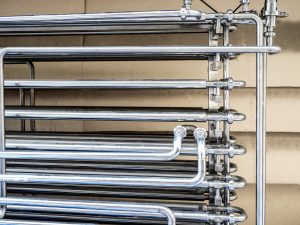 Science and technology go hand in hand, and that relationship has been the key to advancing thermal management concepts over the last several decades. For instance, many of today’s advanced technology takes advantage of the processes that occur when a fluid (like water) changes from a liquid phase to a gas phase and back again. Known as phase-change cooling, modern heat exchangers can utilize these processes to absorb electrical waste heat and transfer it easily and efficiently. By allowing for smaller but more powerful technologies that require minimal energy to operate, phase-change cooling changed the way many industries approach their various thermal management needs.
Science and technology go hand in hand, and that relationship has been the key to advancing thermal management concepts over the last several decades. For instance, many of today’s advanced technology takes advantage of the processes that occur when a fluid (like water) changes from a liquid phase to a gas phase and back again. Known as phase-change cooling, modern heat exchangers can utilize these processes to absorb electrical waste heat and transfer it easily and efficiently. By allowing for smaller but more powerful technologies that require minimal energy to operate, phase-change cooling changed the way many industries approach their various thermal management needs.
How Phase-Change Technology Works
When liquid is exposed to heat, the energy causes it to change into a gas, absorbing the energy without any notable rise in temperature. Because gas is lighter than fluid, it can be easily transferred away from the heat source where it can release the energy and change back into liquid. The technological possibilities of efficiently and reliably transferring heat are virtually endless, but in the case of electrical thermal management, it means the ability to prevent sensitive electronic components from overheating without relying on expensive air conditioning or compressing equipment.
Benefits of Phase-Change Heat Exchangers
Modern heat exchangers take advantage of phase-change cooling by creating closed-loop systems for the cooling fluid to flow through and a small area (such as a heat sink) to dissipate the heat. The liquid flows near the heat source, absorbing it before heat pockets can form inside of the electrical enclosure, circulated away from this source, and then circulated back after the fluid has released the heat. In some applications, the heated fluid may be transferred and utilize for purposes that require sustained heat.
To learn more about how phase-change cooling changed industrial thermal management, call Noren Thermal, Inc. in Taylor, TX, at 866-936-6736.







